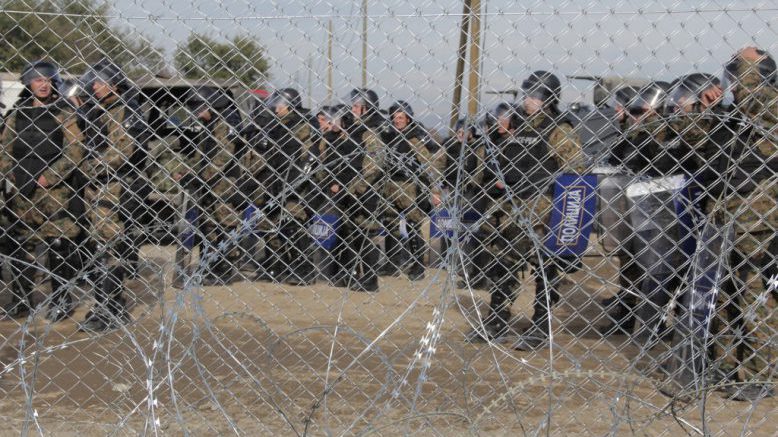ECCHR | 12.02.2017
European Court of Human Rights examines push-backs to Idomeni
The European Court of Human Rights (ECtHR) in Strasbourg is examining the large-scale collective expulsions of refugees from the Former Yugoslav Republic of Macedonia (FYROM) to the border camp Idomeni in Greece in March 2016. To this end, the ECtHR communicated the complaints of eight applicants from Syria, Iraq and Afghanistan to the Macedonian government.
A step forward in the fight against the illegal push-backs at the Greek-Macedonian border
The refugees had submitted individual complaints in September 2016 with the legal support of ECCHR and PRO ASYL. They assert that FYROM’s practice of unlawful expulsions is violating the European Convention on Human Rights. The Macedonian government must now submit a written response by 18 May 2017. Civil society organisations and universities are also permitted to intervene with legal observations.
ECCHR and Pro Asyl support complaints against FYROM to the ECtHR
ECCHR sees these legal proceedings as an important step in the struggle against push-backs at European borders and for refugees’ fundamental “right to have rights.” The applicants are represented by ECCHR’s cooperating attorney Carsten Gericke from Hamburg.
“The closure of the Greek-Macedonian border in March 2016 made legal entry into Europe via the Balkan route de facto impossible and with push-backs the governments in Europe are suspending basic human rights”, said ECCHR General Secretary Wolfgang Kaleck. “Refugees and migrants have a right to have rights. The Idomeni case is a chance for the Court to uphold this principle.” The push-backs in Idomeni violated the prohibition of collective expulsion and the right to access an effective remedy. Neither Macedonia nor other European countries can justify these practices based on an alleged ‘state of emergency’.
The expulsion of at least 1500 individuals from FYROM to Greece on 14 March 2016
The two women and six men (names withheld for protection) crossed the Greek–Macedonian border alongside approximately 1,500 other refugees on 14 March 2016. The Macedonian military apprehended them and forced them back to Greece through improvised holes in the newly constructed border fence. The claimants had no possibility to ask for asylum or to take legal action against their summary deportation from FYROM. These push-backs carried out without any consideration of individual circumstances violate Article 4 Protocol 4 (prohibition of collective expulsion) and Article 13 (right to an effective remedy) of the European Convention on Human Rights.
Since 2014 ECCHR has used strategic litigation to contest the push-back practices in Europe. It also provided support for the ECtHR complaints of two individuals against Spain’s push-back practice at the border in Melilla. Beginning in 2012 Pro Asyl has documented the numerous push-back operations in the Aegean and supported the survivors of the Farmakonisi border surveillance operation before the ECtHR.
Download als pdf:

